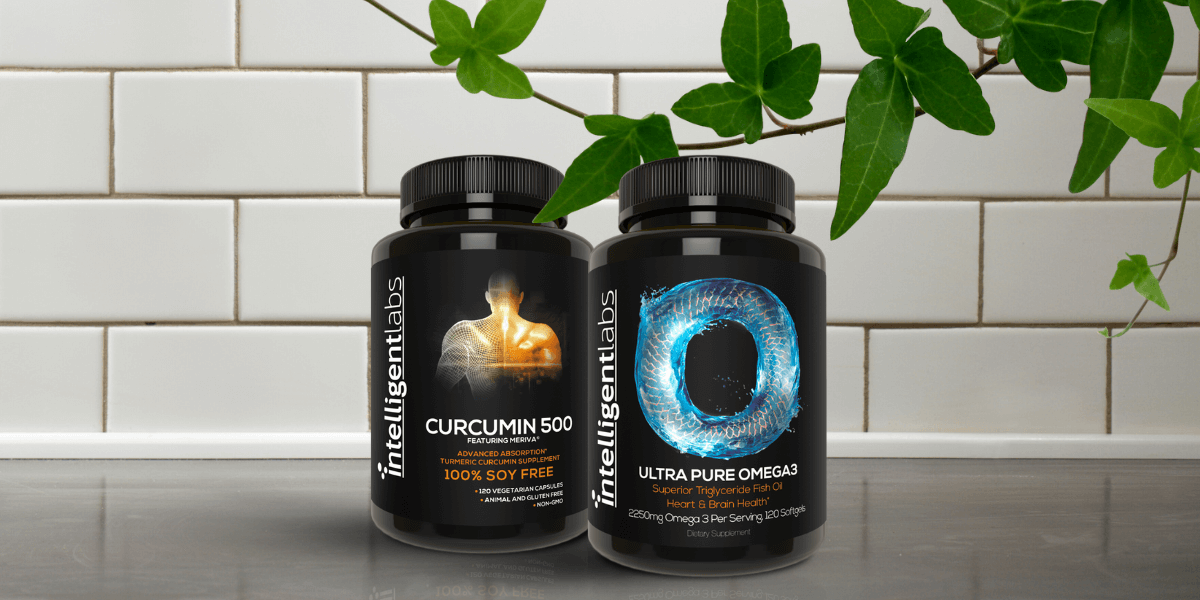If you’ve ever wondered whether turmeric and fish oil can team up to support your health, you’re not alone. These two supplements are known for fighting inflammation and boosting overall wellness. But what happens when you take them together? Let’s dive into their benefits, the science behind their synergy, and how to make them a part of your daily routine.
Table of Contents
What are the benefits of combining turmeric and fish oil?
Growing evidence shows that combining turmeric and omega-3 fatty acids may amplify their health benefits.
Turmeric contains curcumin, a potent compound that helps block pathways that cause inflammation.1 Meanwhile, the omega-3 fatty acids in fish oil help restore balance by reducing inflammatory markers like C-reactive protein (CRP).2
Here’s a closer look at the potential benefits if you take turmeric/curcumin and omega-3 together:
Cognitive Health
Want to keep your brain in top shape? Research shows that curcumin and omega-3s can protect against neurodegeneration. One study found this combo reduces inflammation and oxidative stress – both are key players in Alzheimer’s disease.3
Moreover, curcumin boosts DHA synthesis in the brain, which may help reduce anxiety and support overall mental well-being.4
Metabolic Health
For those at risk of type 2 diabetes, this dynamic duo might be just what the doctor ordered. A clinical trial found that turmeric and fish oil improved insulin sensitivity and lowered triglyceride levels when taken together.5
Inflammation and Heart Health
Chronic inflammation can put your heart health at risk, but curcumin and omega-3 might help. In diabetes patients, combining EPA (from omega-3) and nano-curcumin significantly reduced inflammation, oxidative stress, and cholesterol levels.6 These benefits also extend to cardiovascular health by supporting a healthier inflammatory response.
Cancer Prevention
Animal studies suggest that turmeric and fish oil could help reduce tumor growth. Together, they enhance the body’s ability to fight inflammation and promote cell death in cancerous tissues.7 While more research is needed, these findings are promising for long-term health.
A Few Caveats…
While the potential benefits are exciting, not every study shows a clear benefit from combining both supplements.
For example, a study on cerebrovascular health in older adults found that fish oil improved markers like HDL cholesterol and triglycerides. However, curcumin had no significant effect either alone or in combination with fish oil.8
These results highlight that while the combination can be powerful, individual benefits may vary depending on your health condition.

How can you take turmeric and fish oil together?
The best way to add turmeric and fish oil to your routine is through a mix of real food and high-quality supplements.
Start with natural options
Try adding turmeric powder or fresh turmeric root to your cooking. Think golden milk, curries, or even roasted veggies for a flavorful twist! For omega-3s, enjoy fatty fish like salmon or mackerel a few times a week. These natural sources provide both nutritional benefits and delicious flavor.
Supplements to the rescue
If it’s hard to meet your needs through diet alone, supplements are a convenient backup plan. Our Meriva Curcumin Phytosome is specially designed for better curcumin absorption, while our Ultra Pure Omega-3 Fish Oil gives you the purest omega-3s on the market.
Pro Tip: Take with meals
Both turmeric and fish oil are fat-soluble, meaning they work best when taken with meals containing healthy fats. This ensures maximum absorption and all the benefits they have to offer!
Is it safe to take turmeric and fish oil long-term?
Yes, both turmeric curcumin and omega-3 fish oil are considered safe for long-term use.
Stick to the recommended daily doses: 500 to 2,000 mg for curcumin and 1,000 to 3,000 mg of combined EPA and DHA for omega-3s.
The great news? Your body doesn’t build a tolerance to these supplements. That means you can keep enjoying their anti-inflammatory and health-boosting benefits over time. That said, if you’re on medications or have underlying health conditions, it’s smart to check in with your doctor before starting any long-term supplement routine.
Are there any side effects or risks?
For most people, turmeric and fish oil are a safe combo. But there are a few things to keep in mind:
Both can thin the blood, so if you’re on anticoagulants or blood-thinning meds, talk to your doctor first.9 10
In rare cases, high doses might cause mild stomach upset or diarrhea. These are more likely if you take supplements on an empty stomach or in excess. To avoid issues, stick to the recommended doses and take them with food for better absorption.
Conclusion
Turmeric and fish oil are a powerful pair for improving overall health. Together, they help reduce inflammation, support brain and heart function, and improve metabolic health. While individual results may vary, research shows they work well as a team.
Want to get the most out of this combo? Try our Meriva Curcumin Phytosome and Ultra Pure Omega-3 Fish Oil for top-quality support in your health journey!
💬 Something on your mind? Share your thoughts in the comments. We love hearing from curious minds.
📩 And while you’re here, join our newsletter for more smart stuff (and secret perks)!
References:
- Sadeghi, Mahvash, et al. “Curcumin and Chemokines: Mechanism of Action and Therapeutic Potential in Inflammatory Diseases.” Inflammopharmacology, vol. 31, no. 3, 30 Mar. 2023, pp. 1069–1093, https://doi.org/10.1007/s10787-023-01136-w. ↩︎
- Pan, Lei, et al. “Omega-3 Polyunsaturated Fatty Acids Can Reduce C-Reactive Protein in Patients with Cancer: A Systematic Review and Meta-Analysis of Randomized Controlled Trials.” Nutrition and Cancer, 1 June 2021, pp. 1–12, https://doi.org/10.1080/01635581.2021.1931365. ↩︎
- Velasco-Rodríguez, Luz Del C, et al. “Curcumin and Omega-3 Polyunsaturated Fatty Acids as Bioactive Food Components with Synergistic Effects on Alzheimer’s Disease.” Psychogeriatrics : The Official Journal of the Japanese Psychogeriatric Society, vol. 24, no. 3, May 2024, pp. 701–718, https://doi.org/10.1111/psyg.13115. ↩︎
- Wu, Aiguo, et al. “Curcumin Boosts DHA in the Brain: Implications for the Prevention of Anxiety Disorders.” Biochimica et Biophysica Acta (BBA) – Molecular Basis of Disease, vol. 1852, no. 5, 1 May 2015, pp. 951–961, https://doi.org/10.1016/j.bbadis.2014.12.005. ↩︎
- Thota, Rohith N., et al. “Curcumin And/or Omega-3 Polyunsaturated Fatty Acids Supplementation Reduces Insulin Resistance and Blood Lipids in Individuals with High Risk of Type 2 Diabetes: A Randomised Controlled Trial.” Lipids in Health and Disease, vol. 18, no. 1, 26 Jan. 2019, https://doi.org/10.1186/s12944-019-0967-x. ↩︎
- Asghari, Kimia Motlagh, et al. “The Effect of Curcumin and High-Content Eicosapentaenoic Acid Supplementations in Type 2 Diabetes Mellitus Patients: A Double-Blinded Randomized Clinical Trial.” Nutrition & Diabetes, vol. 14, no. 1, 8 Apr. 2024, pp. 1–12, https://doi.org/10.1038/s41387-024-00274-6. ↩︎
- Swamy, Malisetty V., et al. “Prevention and Treatment of Pancreatic Cancer by Curcumin in Combination with Omega-3 Fatty Acids.” Nutrition and Cancer, vol. 60, no. sup1, 13 Nov. 2008, pp. 81–89, https://doi.org/10.1080/01635580802416703. ↩︎
- Kuszewski, Julia C., et al. “Effects of Fish Oil and Curcumin Supplementation on Cerebrovascular Function in Older Adults: A Randomized Controlled Trial.” Nutrition, Metabolism and Cardiovascular Diseases, vol. 30, no. 4, Dec. 2019, https://doi.org/10.1016/j.numecd.2019.12.010. ↩︎
- “Office of Dietary Supplements – Omega-3 Fatty Acids.” Nih.gov, 2015, ods.od.nih.gov/factsheets/Omega3FattyAcids-HealthProfessional/. ↩︎
- Kim, Dong-Chan, et al. “Anticoagulant Activities of Curcumin and Its Derivative.” BMB Reports, vol. 45, no. 4, 30 Apr. 2012, pp. 221–226, https://doi.org/10.5483/bmbrep.2012.45.4.221. ↩︎




